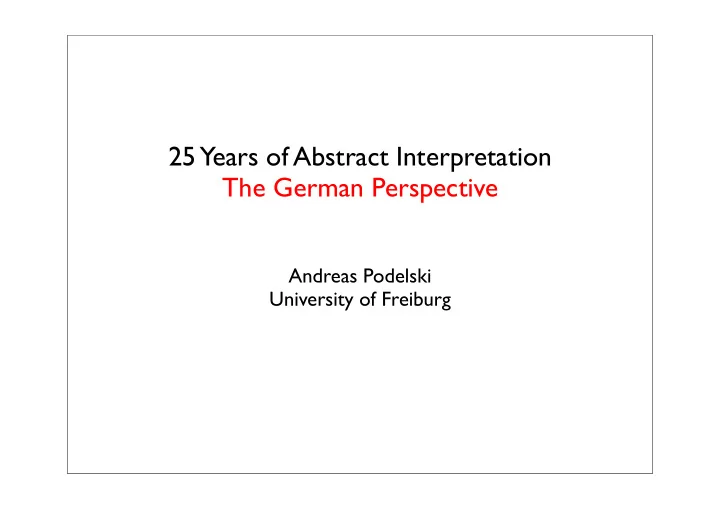

25 Years of Abstract Interpretation The German Perspective Andreas Podelski University of Freiburg
Who? Reinhard Wilhelm Saarbrücken Bernhard Steffen Dortmund Jens Knoop Wien Markus Müller-Olm Münster Helmut Seidl München Andreas Podelski Freiburg
What? 1. Grammar flow analysis 2. Worst-Case Execution Time (WCET) 3. Data flow analysis as model checking 4. Partial Redundancy Elimination (PRE) 5. Decidability frontiers for abstraction 6. Set-based analysis, set constraints 7. Abstraction refinement-based model checking (ARMC) 8. Transition invariants, termination analysis
1. Grammar Flow Analysis • abstract one-step derivation (“N → E”) • concrete lattice of sets of derivation trees, abstract lattice of graphs • first/follow, emptiness, “restraints” between attributes, … • 1982: Möncke & Wilhelm (2006: C & C)
2. Worst-Case Execution Time (WCET) • sum up time that all instructions can take on path (take maximum over all execution paths) • cost of instruction depends on state predicted cache hit ⇒ tighter WCET bound • analysis of reachable configurations: cache, pipelines, ... • SAS’96: Wilhelm, Ferdinand, Martin, ... company: AbsInt (Airbus, Bosch, ...)
3. Data Flow Analysis as Model Checking • data flow facts = temporal-logic properties = fixpoint expressions in mu-calculus • fixpoints in finite abstract lattice? - model checking! • conceptual, practical (company: MetaFrame) • 1991: Steffen (1998: Schmidt, 2000: C & C)
4. Partial Redundancy Elimination (PRE) • compiler optimization (code motion) • extension of total redundancy (availability for all/some paths) • rigorous proof of correctness • unidirectional • Knoop, Steffen, Rüthing, 1992 - ...
5. Decidability Frontiers for Abstraction • When, or how far, do we have to abstract? - Ignore guards! • What abstractions lead to decidability? - Intervals! • 2002 - ... : Müller-Olm, Seidl
6. Set-based Analysis of Programs over Trees • set-based analysis of program P over lists or other trees: 1. transform P ➮ P # such that: post P# = post of P # 2. solve P # (P # is a set constraint) • set constraint = fixpoint equation over tree grammars ! • greatest solution characterizes non-termination • Reynolds’69, Jones’79, Heintze’89 , C & C’92 • 1990 - ... : Frühwirth, Ganzinger, Seidl, Podelski, ...
7. Abstraction Refinement-based Model Checking • completeness relative to widening • ARMC : logic-based implementation (Andrey Rybalchenko’s Model Checker) • abstraction by linear-arithmetic constraint solver (and theory extensions) • verification of networked train control systems • 2000 - ... : Veith, Podelski, Rybalchenko, ...
8. Transition Invariants, Termination Analysis • abstract least fixpoint not good for termination ! • transition invariant = summary = abstract least fixpoint • transition invariant can prove termination ⇒ abstract least fixpoint good for termination ! • 2004 - ... : Cook, Podelski, Rybalchenko
What? 1. Grammar flow analysis 2. Worst-Case Execution Time (WCET) 3. Data flow analysis as model checking 4. Partial Redundancy Elimination (PRE) 5. Decidability frontiers for abstraction 6. Set-based analysis, set constraints 7. Abstraction refinement-based model checking (ARMC) 8. Transition invariants, termination analysis
Who? Reinhard Wilhelm Saarbrücken Bernhard Steffen Dortmund Jens Knoop Wien Markus Müller-Olm Münster Helmut Seidl München Andreas Podelski Freiburg
Ongoing • Oldenburg - Saarbrücken - • Freiburg Saarbrücken AVACS (DFG) hierarchical shape analysis networked embedded systems • Münster, München • Saarbrücken - Freiburg - decidable abstractions of Aachen MSRC - Redmond MSR parallel programs Verisoft (BMBF) • Freiburg Microsoft Hypervisor symbolic shape analysis, • München thread-modular analysis, ... PUMA (Graduiertenschule) • … AI & types & theorem proving
Challenges in AI … in: Concurrency, Search, Control Theory
Concurrency • state explosion • thread-modular verification … Cartesian abstraction • synchronization … intersection of automata • confluence
AI for AI Planning • abstraction for good estimates of distance between states • abstraction is good if search is fast • abstract interpretation for artificial intelligence?
Control Theory • system with non-linear dynamics (e.g. pendulum) • safety • stability
Towards a Conclusion … What is specific about German AI research?
Sets vs. Set Theory • mathematicians use sets (notation for formulating ideas) • logicians do set theory (study of the infinite)
AI vs. AI Theory • program analysis researchers use AI (notation for formulating ideas) • semantics researchers do AI theory (study of the infinite) • German AI researchers are perhaps rather among the AI users
Recommend
More recommend